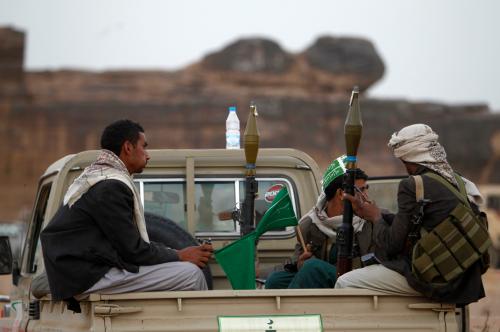Recent reports suggest that the Pentagon is considering how to deliver humanitarian relief to the suffering Afghan people as an integral and early part of any U.S. military intervention against Osama bin Laden and the Taliban government. That is absolutely the right instinct.
Although the precise state of food stocks in Afghanistan is ambiguous, it is crystal clear that the population there cannot enter into winter without receiving major relief. Given the disruptions that have already occurred in civilian relief efforts, the Pentagon will have to provide food and other supplies by putting its own people in harm’s way.
Unfortunately, current reports also suggest that Pentagon planners are wary of air-dropping food into Afghanistan because of their fear that Taliban forces may get their hands on it. This fear is justified—and irrelevant.
In virtually all conflict-ridden societies where food is in short supply, armed fighters are consistently the last to starve. The only way to deprive the Taliban of food is to deprive many millions of civilians of food as well. Since that policy is unacceptable, we must find a way to get relief into the country—just as we have in places such as Ethiopia and North Korea, even as we knew a fraction was going into military hands.
The case for providing relief is overwhelming. Morally, to do otherwise would make a mockery of our commitment to protect innocent lives and to seek justice rather than disproportionate and indiscriminate revenge for those lost in the tragedy of Sept. 11. Politically, the United States cannot afford to reinforce the widespread perception that it is indifferent to the fate of Islamic people.
It is precisely such perceptions that motivate many terrorists, including some of those involved in the events of Sept. 11. Many Muslims, rightly or wrongly, blame the United States for the plight of the Iraqi people and the breakdown of the Arab-Israeli peace process. They also remember how the United States supported the Afghan mujahideen in their fight against the Soviet Union in the 1980s, only to desert them and the Afghan people after Mikhail Gorbachev ordered his troops back home. As a result of that cynical decision by Washington, warfare, poverty and starvation have continued in Afghanistan.
American military action will undoubtedly worsen the plight of Afghans. Even if bombing is done carefully, some innocents will suffer “collateral damage.” Our support for the Afghan resistance will also intensify and broaden the country’s civil war.
Taken together, these actions will further impede the work of relief agencies in a land where more than 1 million are internally displaced and many lack substantial food reserves. Since 1978, at least 1 million Afghans have died because of warfare in their country. U.S. military action is about to add to that toll. We must do everything possible to minimize it, even at some risk to American military personnel.
The methods of providing relief may vary from region to region within Afghanistan and neighboring countries. The U.S. military should soon begin flying supplies into parts of Afghanistan controlled by the Northern Alliance. In most interior parts of Afghanistan, airdrops will be necessary.
In yet other areas, cross-border programs will need to be supported. In certain border regions near Pakistan and Iran, it could be appropriate to deploy modest numbers of American ground forces to set up safe havens where internally displaced Afghans can be fed and sheltered. In those places, at least, it may be possible to disarm them before allowing entry—reducing the risks of feeding Taliban soldiers.
The United States must also pressure the Northern Alliance and other resistance forces to protect civilians within Afghanistan. In the past, such rebel forces have sometimes been worse than the Taliban in their proclivities to carry out reprisal executions, bombardments of innocents and indiscriminate sowing of land mines.
None of these measures requires a fundamental change in U.S. policy. None should necessitate a breakdown in cooperation with our critical Pakistani ally in upcoming weeks and months. But they would go far toward reinforcing the moral clarity and international political appeal of our effort.
The Brookings Institution is committed to quality, independence, and impact.
We are supported by a diverse array of funders. In line with our values and policies, each Brookings publication represents the sole views of its author(s).



Commentary
Op-edHumanitarian Relief Key to U.S. Success
October 8, 2001